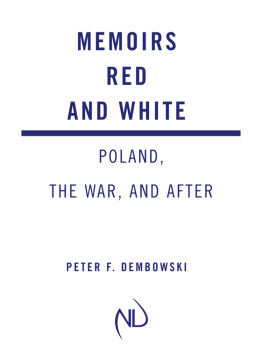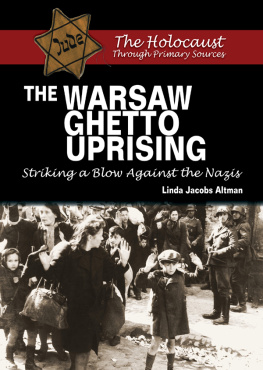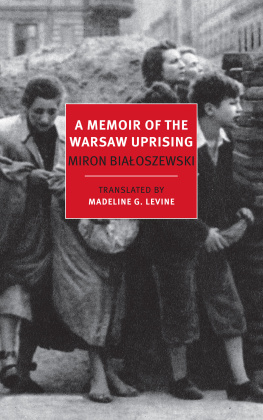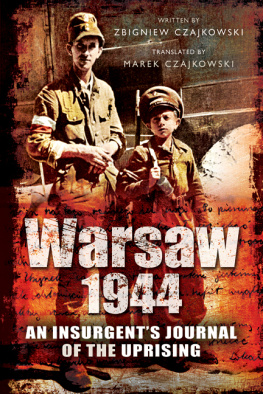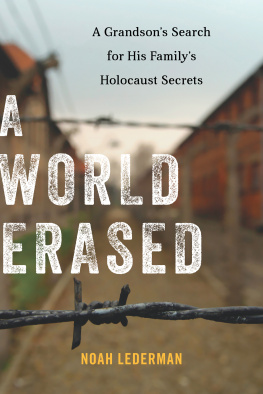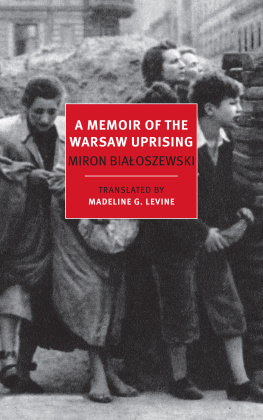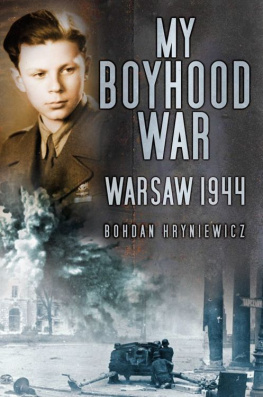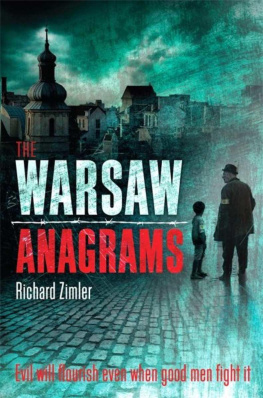
Table of Contents
LIBRARY OF CONGRESS CATALOGUING-IN-PUBLICATION DATA
Radlo, Lucyna B., 1931
Between two evils : the World War II memoir of a girl in occupied Warsaw and a Nazi labor camp / Lucyna B. Radlo.
p. cm.
Includes index.
ISBN 978-0-7864-4032-0
1. Radlo, Lucyna B., 1931 Childhood and youth. 2. GirlsPolandBiography. 3. World War, 19391945Personal narratives, Polish. 4. PolandHistoryOccupation, 19391945Biography. 5. World War, 19391945PolandWarsaw. 6. Concentration campsPoland. 7. World War, 19391945Refugees. 8. Brest (Belarus)Biography. 9. Polish AmericansBiography. 10. ImmigrantsUnited StatesBiography. I. Title.
D811.5.R23 2009
940.53'161dc22 2008044268
[B]
British Library cataloguing data are available
2009 Lucyna B. Radlo. All rights reserved
No part of this book may be reproduced or transmitted in any form or by any means, electronic or mechanical, including photocopying or recording, or by any information storage and retrieval system, without permission in writing from the publisher.
Cover photograph: Lucyna Radlos first communion portrait after the ceremony at St. Alexander Church on Three Crosses Square, Warsaw, 7 June 1941
McFarland & Company, Inc., Publishers
Box 611, Jefferson, North Carolina 28640
www.mcfarlandpub.com
In writing my life story
there were many bitter and tragic moments
that simply had to be told,
no matter how painful,
but one of the enjoyable aspects
of writing this memoir was the reliving
of good times spent with my family and many friends.
A great many individuals,
to whom I am exceedingly grateful,
inspired me to write these reections and recollections,
but most of all I wish to express
my appreciation to my dearest ones:
my beautiful and courageous mother,
my never-to-be-forgotten late father,
my caring and so very patient husband,
and my loving children,
who through all these years were willing
to listen to the bits and pieces
of the story of my life.
Preface
Several different factors contributed to my writing this account of my childhood in Poland. I had always felt compelled to tell my storythe story of a war-torn childhood, a family displaced, forced labor, and the worst, the death of my beloved father in Auschwitz. When it came up in conversation with friends, or even with casual acquaintances, my story always surprised. This was mostly due, I think, to the contrast the traumatic war years had with the comfortable, cosmopolitan adult life I was now living. Americans, especially those who hadnt seen the war firsthand, had a hard time reconciling my carefree present with stories of running from the Soviets, hiding from Nazis, driving through battle-worn countries by ox-cart, or dealing on the black market. At times I myself had trouble believing my own memories. Returning to Warsaw some 40 years after the end of the war only added to the strange sense of unreality, for the city, nearly destroyed by the Nazis, had been entirely rebuilt by the Soviets and only a few memorable places remained.
Writing was a way of unburdening my soul as well as confirming my past. But there was another factor. My daughter gave me genealogical software and encouraged me to construct my family tree. After the Iron Curtain fell, I was able to retrieve genealogical information about my Russian and Polish relatives. But seeing the family tree with only the minimal factsnames, dates, perhaps a photo or two pertaining to each relativeleft me dissatisfied. I wanted to fill them out. Im fortunate to have been blessed with a very vivid visual memory, especially for minute, mundane details. If I experienced it, I remember it. But what of those I never knew? Coincidentally, at this time, my mother, 92 years old at the time, moved to live near me in California. I began to use our daily visits to collect all the missing information she could remember. From notes jotted on odd pieces of paper, I began to construct a family story encompassing my own.
This is the story of average people beset by the ravaging forces of political history. I was eight years old in 1939 when Nazi Germany invaded Poland and the Soviet Union occupied Brest, my mothers hometown. My immediate family had escaped the Soviets by exchanging homes with a family in Warsaw, but this saving arrangement resulted in my fathers arrest on charges of aiding a Jew. I grew up in an atmosphere of uncertainty and fear, even as my resourceful relatives and neighbors attempted to find ways of living life as if normal. Again and again, however, there was disruption and loss. Recounting this odyssey, I was amazed at the resilience of my family and the very human ability to recover, even cheerfully, from misfortune.
1
War: Choosing Between Two Evils
In a small way I first became a victim of World War II before it even started: in the spring of 1939 the inhabitants of the Polish city of Brzesc, including my parents, were so preoccupied with anxieties about and preparations for an impending war with Germany no one noticed that the sixteenth of May was my eighth birthday. A state of panic was beginning to develop in the city, with families stocking up on food and first-aid supplies, gathering family documents and photographs, clearing their basements for eventual use as bomb shelters, and digging foxholes in the open areas next to their dwellings. The city authorities also ordered proper bomb shelters to be built and the public was told to be on the alert for air raids. The military were more apparent than usual and civilian men were being drafted. My uncle, Misha Shlykov, who was in the reserve, had to leave for training with his reserve unit, where he became chief of food procurement. Zhorzh Vakulchik, husband of Mothers sister Olga, was drafted into the army, but my father, who had invalid status because of wounds sustained in World War I, was excused from the draft, as was my uncle Nikolay Padukow, because he had only a part of one lung left after having had tuberculosis.
On the 1st of September 1939, at 4:45 A.M., Nazi Germany attacked Poland on land, at sea, and from the air. Brzesc (formerly, as well as after the war, known as Brest), an important railroad junction, was bombed from the air that same day, as were other cities in Poland. Sirens screamed loud and long. First we heard the bombs exploding and then we began hearing antiaircraft artillery firing nonstop. And there was some rifle fire, presumably firing at low-flying aircraft, but only now and then. Mother and I were the very first to run outside to the previously dug shelter (foxhole) that was more like an open grave site, except longer and just as deep, if not deeper. We jumped into it and pressed our bodies against its walls. The bombardment was so frightening and the rush to safety so hectic that Father, who was running behind us, was knocked down in the corridor of our apartment building. Neighbors, seeing him lying flat on the floor, quickly lay down beside him, thinking that was precisely the thing to do. Father shouted to them to get up and run for shelter. The chaos was such that no one knew what to do. Soon things became quiet; the bombing had been precise and quick. Mother and I tried to get out of our foxhole, but climbing out was impossible. Finally, Father came to our rescue. We later learned that one of the first bombs that fell on Brest fell on our 100,000 zloty house, a small commercial building that my parents had bought with lottery winnings, after I had helped select the winning numbers. The location of the building was to blame, it being right next to the railroad station, a prime target. Padukows hotel, which was almost next door, did not sustain any damage. Fortunately, our property was empty of occupants, since they had all managed to find shelter away from the building. No one was killed or injured, but there was just a pile of rubble left. After the war, when we had resettled in the U.S., we made enquiries of the Belarussian government concerning restitution of the site where the building had stood at ulitsa Stetskevicha 4 in Brest and received the reply that the property had been nationalized by Soviet authorities in 1940 and that we now had no valid claim of ownership.
Next page

